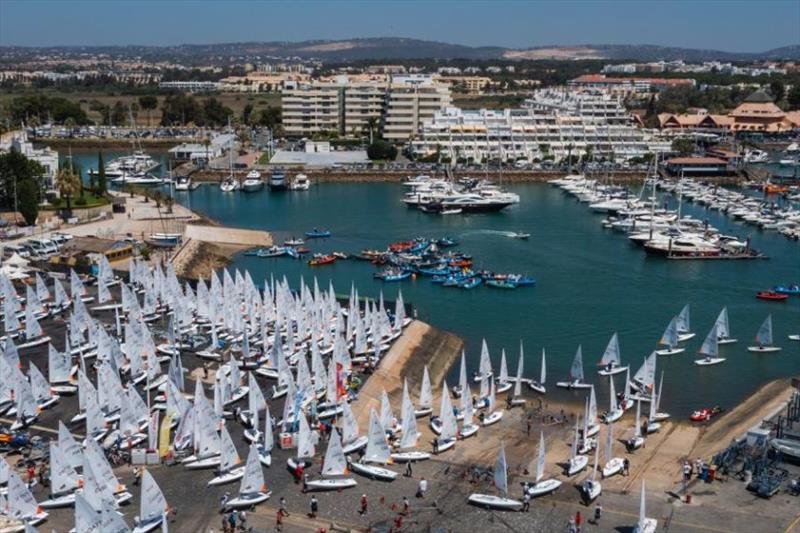
ILCA's Path to a Sustainable Future
by The ILCA Technical Team 16 Feb 14:00 GMT

ILCA 4 Worlds 2022 © Prow Media
Our Class and boat have decades of history and a legacy beyond measure. The original innovative design and construction techniques of the ILCA dinghy have endured through the decades, with over 227,000 boats built, allowing us to race with the same boat our parents used when they were our age.
However, ILCA remains at the forefront of competition in the highest Olympic arenas. To remain here, it has been necessary to evolve with the times and the world, which has been the behind-the-scenes job of multiple ILCA Technical Officers and Builder Representatives over the last five decades.
Why Sustainability?
As the world evolves, so must our Class. In a world where the consciousness of the impact we have on our planet grows, ILCA must be at the forefront of the sustainability movement when it comes to sport and sailing. Balancing the necessity for change and improvement with legacy and history is no easy feat for the ILCA team, especially on the scope of carbon footprint and environmental sustainability.
On a human side, we have the strongest numbers of any dinghy class in the world, with World Championships exceeding 400 sailors and active racing members above 13,000 sailors worldwide making the ILCA Class healthy and strong on social sustainability. Yet, from an environmental sustainability point of view, the bigger our fleets are, the larger the number of support staff, coaches and family members participating inevitably increases the carbon footprint of our events.
On the technical side, many of the production materials and processes employed in the manufacturing of the 2,500 boats sold annually are not at the forefront of modern technology. Given our core value of being a strict One-Design Class, OSEPODS is a necessity that is hard to go against. From a sustainability point of view, the situation is complex. Using the production materials as an example, multiple considerations come into play. Although they may not be the most recent materials available to the marine industry - chop-strand mat glass fibre for the more curious ones - they are well established, widely available and mostly produced locally to the 10 Builders ILCA has established worldwide, therefore reducing the significant transport emissions associated with these materials. More importantly, maintaining use of these materials ensures older boats do not become obsolete and increases their useful lifespan.
These are some examples of why a tailor-made sustainability plan and suite of solutions is needed for a Class like ours for an effective change on our environmental impact. Our process is to create a solution that is driven by carefully collected and analysed data to deliver targeted proven solutions that continue to uphold our values and legacy while ensuring we keep up with the necessities of a changing world.
New Perspectives
Over the last couple of years, ILCA has engaged with several industry stakeholders, including World Sailing, whose sustainability agenda and focus helps us to accomplish our goals. In the last 12 months, significant resources have, behind the scenes, been deployed on ILCA's path to sustainability.
The Technical team has attended conferences with top industry players, such as the JEC Conference, the leading composites show in Europe, whose focus is shifting to sustainable products and processes. From there, several partnerships have been built with other industry stakeholders that share the same values for fact-driven change, leading to discussions on areas such as bio materials, carbon sequestration, clean events, recycling solutions and more. A current project ILCA is engaged with involves a Masters student researching possible alternative materials for the ILCA dinghy that not only have a lower impact to the environment, but also have similar mechanical properties as our current materials used to ensure compatibility.
Real data is important to make decisions and actions that give real benefits. Consequently, ILCA needs to first establish our baseline and analyse our current position before taking action. To this effect, we have initiated a Life Cycle Assessment (LCA) of our Class focusing on the area of sustainability in events and boat production. Only by quantifying the impact of our current practices and comparing them to the impact of possible alternatives, can we be sure our actions are driving us to the desired results.
Looking Ahead
Over the next year, we will continue to build and refine our detailed LCA so that we can confidently start to establish areas of focus and action. In parallel, we will continue to develop our partnerships with relevant entities that will help us gain access to disruptive solutions. It is here where it is important to look at things with creativity, innovation and an open mind, because it is our strong legacy and active member base that helps us be an incredible platform for startups, research facilities, universities and companies within the marine industry, enabling us to access technologies and solutions that would otherwise be beyond reach.
Equally, over the upcoming year we aim to develop a realistic and impactful sustainability plan that we hope aligns with our members and the world we share, living connected to nature via the ocean, seas, rivers or lakes we sail and race in everyday. We welcome feedback, ideas and support via the Technical Feedback Form as we evolve through this sustainability journey.